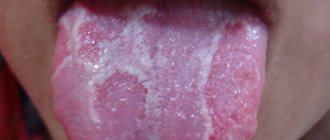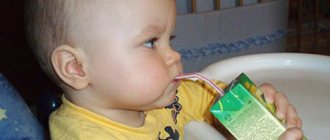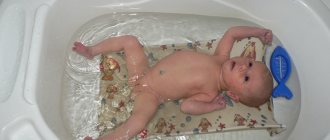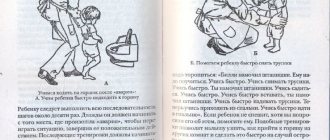Where does bad breath come from in a child?
Bad breath in adults and children is present in almost 80% of the population and occurs due to the accumulation of a large number of bacteria in the oral cavity. But in 25% of cases it is caused by dysfunction of the digestive system and other equally serious diseases.
List of main reasons:
- Poor oral hygiene.
Most often, children suffer from this disorder because they do not always follow the rules of hygiene. All parents know how difficult it is to teach a child to brush their teeth thoroughly twice a day. This is how a child develops bad breath. - Poor nutrition.
The problem may also arise due to a certain diet - an abundance of sweet or protein foods, consumption of foods with a specific aroma (onions, garlic, cabbage). - Increased body temperature.
During illness, metabolism increases, moisture is quickly removed from the body, so dry mouth can also cause halitosis. Therefore, temperature and bad breath in a child are also closely related. - Change of bite.
When teething, bad breath in children is associated with partial decomposition of the oral mucosa, since a new tooth injures the gums.
All these causes of bad breath in a child are not dangerous to health. The problem will disappear on its own after hygiene procedures, teething or the baby’s recovery. However, some symptoms should cause an immediate reaction in parents, and we will talk about them in more detail.
What can you do at home?
To remove bad breath, you need to get rid of the problems that caused it. Firstly, you should put your teeth in order and establish normal saliva flow. For this:
- Give your baby lemon water periodically;
- Ensure that the room maintains a humid climate (65%);
- Systematically check the condition of the chewing organs at the dentist;
- If your nose is stuffy, rinse it with a salt solution several times a day;
- Contact your ENT specialist to check your adenoids;
Make sure that food debris does not accumulate in the mouth, which can cause inflammation. You can practice rinsing your mouth with decoctions of oak bark, mint, and chamomile.
Causes of iso smell in children
Why does my child have bad breath? All parents are sensitive to the health of their children, and any changes in the baby’s well-being cause anxiety and sometimes panic. We have compiled a table of deviations in which concern is more than justified.
| Type of smell | Causes | What to do? |
| Acetone smell from child's mouth | Appears in acetone syndrome. This dangerous condition is characterized by the accumulation of acetone and acetoacetic acid in the body, which in the future can lead to the development of tachycardia, diabetes or urolithiasis. | If you suspect the occurrence of these diseases, you should immediately call an ambulance and give the patient a teaspoon of boiled water every 10 minutes. |
| Putrid odor from a child's mouth | Occurs as a result of ENT diseases, dental diseases, and esophageal disorders. | It is necessary to contact a dentist who will identify the exact cause of the disorder and prescribe appropriate treatment. |
| Sour breath in a child | Indicates problems with the gastrointestinal tract, in particular the presence of gastritis. | An examination by a gastroenterologist will show an accurate diagnosis. |
| Rotten breath in a child | May be accompanied by associated symptoms such as diarrhea, bloating, and coating on the tongue. This means that air filled with hydrogen sulfide gases comes out of the stomach. The smell of egg from a child’s mouth can indicate increased acidity of gastric juice, liver failure, ulcers, kidney disease, and even gastrointestinal oncology. | The gastroenterologist will order tests and find out why this situation has arisen. |
| Vinegar smell from child's mouth | Perhaps this is a sign of malfunction of the pancreas, intestinal dysbiosis or periodontal disease. | The dentist will determine the source of the problem and help your child regain fresh breath. |
| Sweet odor from a child's mouth | Indicates hepatitis or cirrhosis of the liver. | In this case, parents should urgently visit a gastroenterologist. |
| The smell of snot from a child's mouth | Signals inflammatory processes in the nasopharynx. | An ENT specialist deals with this disorder; he will diagnose and prescribe the correct course of antibiotics for the baby. |
| Smell of vomit from a child's mouth | Characterizes poor outflow of bile. | An ultrasound of the abdominal organs will help eliminate the disorder. |
Dry mouth is another possible cause of bad breath in a child. Infants constantly accumulate saliva in their mouths. It is saturated with oxygen, which destroys harmful bacteria on the gums and tongue. Older children produce less saliva, and dry mouth can be attributed to a number of factors.
- Adenoids, formations on the tonsils, block the nasopharynx. Air enters the lungs through the mouth much more freely than through the nose.
- Sinusitis or chronic runny nose also prevents the baby from inhaling through the nose.
- A deviated nasal septum may obstruct air flow.
- Unconscious breathing through the mouth during sleep. In this case, you may notice a particularly strong odor from the child’s mouth in the morning, then the best solution would be an examination by a pediatric otolaryngologist.
When should you urgently consult a doctor?
If a two-year-old child has bad breath all day long, and hygienic cleaning does not solve the problem, then he needs to be shown to a dentist or gastroenterologist.
Also, a visit to a doctor is important if you have the following symptoms indicating the development of a pathology accompanied by halitosis:
- pain in the stomach, intestines, liver or kidneys;
- constipation or diarrhea;
- heartburn;
- flatulence;
- belching;
- nausea and vomiting;
- gray or yellow coating on the tongue;
- heat;
- bleeding gums;
- severe weakness;
- thirst.
To establish a diagnosis, the dentist will examine the oral cavity and conduct a study using a halimeter, which measures the level of volatile sulfur compounds formed during the life of bacteria. A scraping from the tongue is also taken and the microbiological composition of plaque on the teeth is examined.
Important! If the examination results do not confirm the presence of a dental problem, then the patient is referred to other specialists (gastroenterologist, ENT, endocrinologist).
How does a child's age affect bad breath?
Surely all parents remember the smell of a baby's breath - a pleasant, milky aroma.
This happens as a result of the activity of lactic acid bacteria, which create a favorable environment and prevent pathogenic microflora from multiplying. The smell from the mouth of a child under one year old should be exactly like this, reeking of milk. Bad breath in a child aged 2-3 years indicates poor oral hygiene, since the child at this age is just learning to brush his teeth properly. Observe him during the procedure and explain how important it is to monitor the condition of the mouth.
Bad breath in a 4-year-old child is most likely associated with an excess of sweets, protein and carbohydrate foods, since children at this age actively explore the world around them, discover new tastes and put not only edible treats in their mouths, but also any interesting things in general .
In a 5-6 year old child, bad breath indicates the possible development of pathological processes. The dentist and pediatrician will find out the cause of the problem and prescribe treatment while the disease is at an early stage.
Bad breath after 10 years in a child is an alarming symptom. He can talk about poor nutrition, disturbances in the functioning of the body. If the smell persists for a long time, visit a specialist as soon as possible.
Odor as a symptom of disease
But sometimes there are situations when a bad aroma is a symptom of improper functioning of the organs and systems of the body.
- The stench can cause gum inflammation in a child. The problem occurs when there is an incorrect bite, tissue injury, or vitamin deficiency.
- If there is a pathological tooth in the mouth, it will smell bad. This happens with caries and periodontal diseases. Only a trip to the dentist can eliminate the disease.
- Diseases of the nose, ear, and throat can provoke the problem.
- With any acute respiratory viral infection, the mucous membranes dry out, and a lot of additional mucus is formed, which the bacteria feed on.
- Chronic diseases of the airways: pneumonia, bronchitis and other ailments.
- A sour smell indicates problems with the gastrointestinal tract, most often the appearance of gastritis.
- Allergic rhinitis is manifested by putrid breath.
- Inflammation of the adenoids leads to stench.
If alarming symptoms appear, you should definitely show your child to a pediatrician. Parents should take into account that children at this age are not very good at brushing their teeth. We need to help them with this and monitor the hygiene process.
Treatment of bad breath in children
In most cases, halitosis does not require special treatment; it is enough to pay attention to your baby’s oral hygiene, change the diet, and reduce the consumption of sweets and protein foods. You can also get rid of an unpleasant odor using traditional methods - for example, rinsing your mouth with an infusion of chamomile, mint or oak bark.
If, after taking the measures, the smell still does not disappear, you should contact your pediatric dentist.
During diagnosis, the doctor must assess the intensity of the unpleasant odor, examine the tongue and oral cavity, ask the patient to take the necessary tests, and also conduct an instrumental examination or x-ray. Based on this data, he can prescribe the necessary medications himself or refer you for consultation to a specialized specialist - a gastroenterologist, an ENT specialist, or, in some cases, a pulmonologist. If the cause of bad breath in a child is identified in time, treatment will proceed faster, and the risk of reoccurrence of this phenomenon will be reduced to almost zero.
What should it be like for a healthy newborn?
exact norm for what a healthy baby should smell like . All children have different heredity and nutrition (some are naturally fed, some are bottle-fed), and accordingly, everyone’s breath can smell differently. However, most parents are convinced that babies should normally have a milky smell (this only applies to breastfed babies, since the subtle aroma of the formula quickly disappears).
Note ! The most important thing is that the smell is not sour, sweet, bilious or putrid, as this may indicate serious health problems (it is worth examining the liver and gastrointestinal tract).
Preventing bad breath in children
To prevent the occurrence of this unpleasant problem, you should follow a few simple but very important rules.
- From the moment the first baby tooth emerges, parents need to brush their baby’s teeth twice a day with a soft brush. And when the child grows up, make sure that he correctly performs the procedure on his own.
- Teach your child to brush his teeth, show him by personal example how to do it. If you have difficulty in this matter, contact your hygienist for advice. This specialist has many manuals, films and interesting devices to teach your child the necessary skills in a playful way.
- Review your diet, add more sour fruits - apples, oranges and lemons increase salivation.
- Eliminate sweets from your diet and replace them with honey.
- Make sure your child drinks enough fluids. But not juice and soda, but clean drinking water.
- Visit your dentist regularly for preventative checkups.
Dear parents, remember that strong breath in children is a possible symptom of much more serious problems. It is in your power to prevent the formation of pathological processes in the body or stop their development at an early stage. Pay close attention to any negative changes in your child's health to prevent complications and chronic diseases in the future.
Diagnosis of the cause
It is important to treat dental caries in a timely manner. Particularly dangerous are pathological holes between the crowns, where only a dentist can reach. The appearance of white areas is the initial stage of the disease. Therefore, do not wait until complications appear, immediately show your child to the doctor. This will prevent tissue destruction and rotting of food debris in the hollows.
Before prescribing treatment for bad breath, the doctor will conduct an examination, approaching this issue with particular care. To begin with, eliminate acetone. The dentist will then evaluate the condition of your gums and chewing organs. If a child has plaque or hard deposits, they must be removed. If necessary, the small patient is referred to an ENT specialist. The doctor rules out candidiasis, runny nose, and sore throat. If the cause of halitosis is not found, the child should be shown to a pediatric gastroenterologist.
Why can a 1-year-old infant develop an unpleasant “aroma”?
Poor or complete lack of oral hygiene
A child, even if he is 1 year old, must take care of oral hygiene. More precisely, parents should do this, thereby instilling hygiene skills in their baby. No matter how carefully the parents crush the food, or the baby chews the food on his own, its crumbs still remain in the oral cavity.
During the night, various microorganisms intensively develop, using food scraps as food. There is practically no saliva produced at night, so bad breath is noticeable especially in the morning.
Presence of carious teeth or other dental problems
By carefully examining the child’s teeth (especially carefully the teeth of a child who loves sweets), parents can make sure that caries (white or dark spots on tooth enamel) has already begun its unseemly work in the most inaccessible places.
Reddened gums, their swelling, and swelling should also alert adults. If such problems occur, then dad and mom should go to the dental clinic with the child in the near future.
Dryness of the oral mucosa
Saliva has bactericidal properties , which maintain normal microflora in the mouth. An imbalance in the oral cavity caused by dysfunction of the salivary glands provokes the active development of pathogenic microflora, which, in turn, contributes to the activation of inflammatory processes in the mouth.
It should be noted that any microorganisms, as a result of their vital activity, release special substances, the main component of which is sulfur - an unpleasant-smelling substance.
The most common causes of dryness are lack of moisture in the room air (long-term operation of heating devices, high concentration of dust in the air) or in the diet, systematic breathing of the baby through the mouth due to chronic rhinitis or proliferation of adenoid tissue.
Pathologies of ENT organs
Any pathological processes in the ENT organs (ear, throat, nose), including those mentioned above, can cause the appearance of an unpleasant “aroma”. Many of these diseases are caused by the increased development of bacterial infections in the nose, larynx, and ears due to insufficient salivation or changes in its chemical parameters.
The lack of area for the normal functioning of microorganisms forces them to develop new “territories”, and thus inflammation begins to develop further and further.
Other diseases
Any disease of the upper respiratory tract, upper gastrointestinal tract, or a number of metabolic diseases can also be accompanied by an unpleasant odor from the baby’s mouth.
- A sour aroma is a signal that the baby may have stomach problems, which are often accompanied by excessive release of hydrochloric acid.
- Putrid and rotten odor , which develops due to the accumulation of insufficiently digested food residues in the organ, may indicate intestinal pathologies.
- The smell of acetone is a sure sign of the development of acetone syndrome, diabetes, and gall bladder problems.
- The noxious- sweet aroma should especially alert adults: as a rule, its presence is evidence of the development of serious liver diseases, including hepatitis.
Food
No one has canceled the fact that after eating certain foods, an unpleasant odor begins to be felt from the mouth. Children are no exception in this matter, especially if they are switched to artificial nutrition and complementary feeding at the age of one.
Protein-rich foods (dairy, meat, fish, nuts) are important for the full development of the baby’s body, but their excess may not have time to be digested by a small stomach. As a result, the intestines are simply littered with the remains of protein foods, the decay of which gives an extremely unpleasant “aroma”.
Taking medications
Taking vitamins or antibiotics during the treatment of any disease provokes the appearance of an unusual odor from the mouth of a one-year-old baby, vaguely reminiscent of the smell of the drugs themselves.
Treatment approach based on cause
After establishing in a medical institution the true cause of a strong odor from the child’s mouth, the pediatrician, as a rule, prescribes a suitable treatment regimen or refers the little patient to a specialist with a narrow focus: a dentist, otolaryngologist, gastroenterologist.
The approach to therapy is comprehensive:
- Drug therapy . Medicines or manipulations selected by specialists have an impact on the organ or system that is “failing.” It is strictly forbidden to prescribe any medications for your baby on your own! Such a decision is extremely dangerous for the still fragile body of a one-year-old child.
- Organizing proper nutrition for the child . It is advisable to reduce the amount of sweets in the baby’s diet, however, increase the amount of fruits (especially citrus fruits) and vegetables in order to produce saliva, which is a kind of antiseptic. Apples are most often recommended by doctors: these fruits contribute to better digestion of food, and their solid structure when chewed will produce mechanical cleansing of the oral cavity from pathogenic microorganisms.
- Use of traditional medicine methods . Rinsing the mouth with herbal infusions or giving the baby various decoctions to drink will help cope with the unpleasant symptom. It is possible to include non-traditional remedies in therapy only after the permission of the attending physician!
If the doctor determines that the problem of “stench” is a failure to comply with the basic rules of the baby’s life or insufficient hygiene, then the unpleasant symptom can be eliminated at home.











